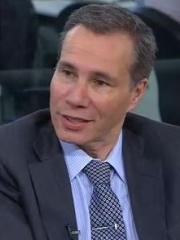
The Most Famous
LAWYERS from Argentina
Top 1
The following people are considered by Pantheon to be the most legendary Argentinean Lawyers of all time. This list of famous Argentinean Lawyers is sorted by HPI (Historical Popularity Index), a metric that aggregates information on a biography's online popularity.

1. Alberto Nisman (1963 - 2015)
With an HPI of 48.50, Alberto Nisman is the most famous Argentinean Lawyer. His biography has been translated into 16 different languages on wikipedia.
Natalio Alberto Nisman (5 December 1963 – 18 January 2015) was an Argentine lawyer who worked as a federal prosecutor, noted for being the chief investigator of the 1994 car bombing of a Jewish center in Buenos Aires, which killed 85 people, the deadliest terrorist attack in Argentina's history. On 18 January 2015, Nisman was found dead at his home in Buenos Aires, one day before he was scheduled to report on his findings before a Congress inquiry with supposedly incriminating evidence against high-ranking officials of the then-current Argentinian government including former president Cristina Fernández de Kirchner, regarding the Memorandum of understanding between Argentina and Iran. Nisman's death was initially ruled a suicide by a group of forensic experts appointed by Argentina's Supreme Court in 2015. In 2017, Nisman's death was later determined to have been a homicide by a forensic group of the Gendarmerie. In December 2017, Cristina Kirchner was indicted for treason by judge Claudio Bonadio. In March 2018, it was announced that she would be put on trial for an alleged cover-up of Iran's role in the AMIA bombing (the "treason" charge was later dropped from the accusation) through the intended never-ratified Memorandum of understanding between Argentina and Iran. After analyzing the claims of the defendants in the case for the never-ratified Memorandum with Iran, on October 7, 2021, the Federal Oral Court 8 declared the case null and void. The judges concluded that there was no crime in the signing of the agreement with Iran and declared a judicial dismissal of Cristina Kirchner and the other defendants. In 2023, on appeal, the Federal Chamber of Cassation revoked the dismissal that Cristina Fernández de Kirchner had benefited from and ordered her to be tried for the alleged cover-up for which Alberto Nisman accused her regarding the Argentina-Iran Memorandum of Understanding. The relatives of the victims of the AMIA attack had demanded that the oral trial against the former president be held. The reasons are that "the accused persons are attributed to the organization of a complex criminal plan to achieve or favor the impunity of the Iranian citizens suspected of having participated in the terrorist attack on the AMIA headquarters through two parallel channels, one formal—with the signing of the memorandum of understanding—and another informal, with unofficial negotiations." In April 2024, 30 years after the attack of AMIA, the Federal Chamber of Cassation ruled in a sentence that the government of Iran was the mastermind behind the attack and ordered its execution. The Cassation Chamber stated that Iran orchestrated the massacre and classified it as a crime against humanity. In a divided sentence, two of the three judges of this second instance tribunal (Carlos Mahiques and Diego Barroetaveña) ruled that the attack was part of Iran's political and strategic design and was executed by the terrorist organization Hezbollah, also considering Alberto Nisman's hypothesis as correct and corresponding with the alleged circumstances that originated the attack on AMIA, although the third judge, Ángela Ledesma, differing completely from her colleagues, refused to make any consideration of the responsibility of Hezbollah or Iran "taking into account that this topic is not part of the object of the appeals presented", and harshly criticized the original judicial investigation since it never followed through (or disproved) the so-called "Syrian trail" hypothesis for the attack, choosing instead to focus solely on Iran. However, the Cassation Chamber's ruling did not occur in the context of an official trial against those responsible for the AMIA attack, being instead part of a parallel process that was opened to investigate a cover-up carried out by the first judicial and government officials who were in charge of the "AMIA case" during the 1990s and early 2000s; the attack against the main community center of the Argentine Jewish community not only remains as the worst act of terrorism in the history of Argentina but also as one of the greatest examples of impunity three decades later: with none of the perpetrators arrested or a single suspect tried, those who received prison sentences were instead the first judge (Juan José Galeano), paid informants, prosecutors and other officials who handled the original case and investigation. The judge in charge of Nisman's death case since Bonadio's demise in 2020, Julián Ercolini, chose to partially take the Gendarmerie's forensic findings indicating a murder (similarly as with the Federal Chamber and the Court of Cassation) as well as ratifying the presumption of homicide, so that is the figure that still stands nine years after the death of the prosecutor, but far from finding the material authors, the investigation apparently remains determined to only search for whoever gave the alleged order to murder Nisman. Meanwhile, other files that also emerged from the main investigation are completely paralyzed, including a case for alleged money laundering that involves relatives of Nisman and his underling Diego Lagomarsino, a case for an undeclared bank account in New York and purchased lands in Punta del Este, and suspicious real estate ventures in Buenos Aires. To date, and despite all the accusations, theories and alleged evidence collected about Nisman's death, no actual trial has been carried out to determine with complete certainty what really happened and formally sentence the guilty parties in case of murder.
People
Pantheon has 1 people classified as Argentinean lawyers born between 1963 and 1963. Of these 1, none of them are still alive today. The most famous deceased Argentinean lawyers include Alberto Nisman.

